牛津版初中英语九年级下册Unit4 教案
九年级英语下册 Unit4 教案 牛津
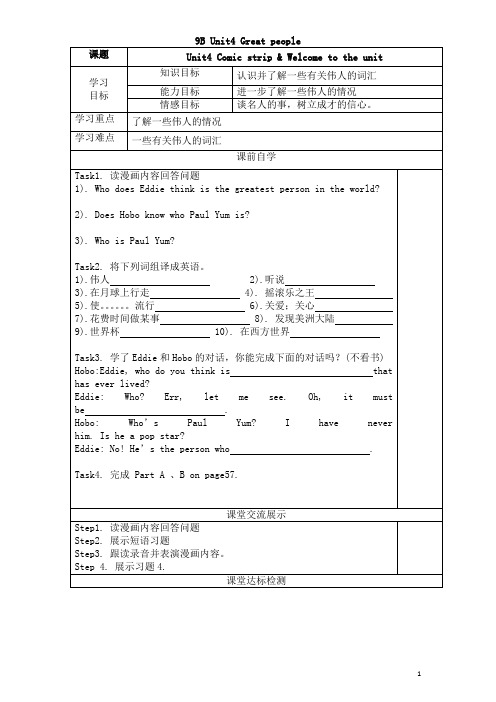
7)What do people think the aliens tried to do?
8)What was the highest award that Neil Armstrong received?
7.What did you study when you were in the university?(engineer).
8.The whirligig(陀螺)(spin) fast a moment ago, but it stopped now.
9.He is one of the greatest(pilot) in our country.
5.完成书Page60 B1,B2。
课堂交流展示
Step1.展示重要单词用法。
Step2.展示重点句子
Step3.读课文,完成Page60 B1,B2。
Step 4阅读课文,展示问答题
Step5.跟读课文,判断题
Step6.讨论Discussion
If you are an astronaut, what do you want to do on the moon? Talk about it with your partners.
1). Who does Eddie think is the greatest person in the world?
2). Does Hobo know who Paul Yum is?
3). Who is Paul Yum?
Task2.将下列词组译成英语。
1).伟人2).听说
3).在月球上行走4).摇滚乐之王
初中英语九年级下册(牛津译林版)Unit4Studyskills教学设计

师:Next, we will learn some reading strategies. By using these strategies, we can improve our reading efficiency and understanding.
2.学生在小组内分享阅读心得,讨论文章的主旨大意和支撑细节,并选取一名代表进行汇报。
师:After discussing, each group should share your reading experiences and tell us the main idea and supporting details of the passage.
1.培养学生正确的学习态度,使他们认识到学习英语的重要性,激发他们学习英语的内在动力。
2.通过学习本章节内容,使学生认识到良好的学习习惯和技巧对于提高学习效率的重要性,从而培养他们自觉养成良好的学习习惯。
3.引导学生学会合作与分享,培养他们的团队精神,让他们在合作中体验到学习的乐趣,增强自信心。
4.培养学生热爱生活、积极向上的价值观,使他们能够将所学知识运用到实际生活中,提高他们的生活质量。
师:Please hand in your exercises, and I will give you feedback later.
(五)总结归纳(500字)
1.教师引导学生回顾本节课所学内容,总结学习技巧和阅读策略的重要性。
师:Today, we have learned some study skills and reading strategies. Can you tell me why they are important in our learning process?
牛津译林版英语九年级下册Unit4Task优秀教学案例

(三)情感态度与价值观
1.学生将通过对环境问题的讨论和思考,认识到环境保护的重要性,增强环保意识,树立人与自然和谐相处的价值观。
2.学生将学会关爱他人,尊重他人观点,培养合作精神,提高社会责任感。
(三)学生小组讨论
1.教师布置讨论任务:“请你们分组讨论环境保护的方法,并选出一种你们认为最有效的办法。”
2.学生分组进行讨论,鼓励每个成员分享自己的观点和经验,形成小组的共同意见。
3.各小组汇报讨论成果,其他小组成员给予评价和反馈,教师进行指导和总结。
(四)总结归纳
1.教师引导学生回顾本节课的学习内容,帮助学生梳理和归纳环境问题的原因、危害和解决方法。
在教学过程中,我将学生分组进行讨论和实践,培养了他们的团队合作能力和沟通能力。通过这种方式,学生能够更好地理解和掌握课文内容,提高他们的口语表达能力和团队合作能力。同时,小组合作也有助于学生发现他人的优点和不足,培养他们的同理心和关爱他人的品质。
4.亮点四:反思与评价帮助学生建立自我评价和自我改进的能力。
二、教学目标
(一)知识与技能
1.学生能够掌握并运用本课关键词汇和主要句型,如“environmental problem”、“take action”等,以及能够运用一般现在时表达习惯动作和普遍真理。
2.学生能够理解课文内容,把握文章结构,分析作者观点,并能运用阅读策略,如略读、寻读等,快速获取信息。
在教学过程中,我引导学生对自己的学习过程进行反思,发现自己的优点和不足,并给予反馈和指导。通过这种方式,学生能够更好地了解自己的学习情况,建立自我评价和自我改进的能力。同时,学生之间的互相评价也有助于培养他们的批判性思维和关爱他人的品质。
牛津译林版英语九年级下册Unit4ComicstripWelcometotheunit教学设计
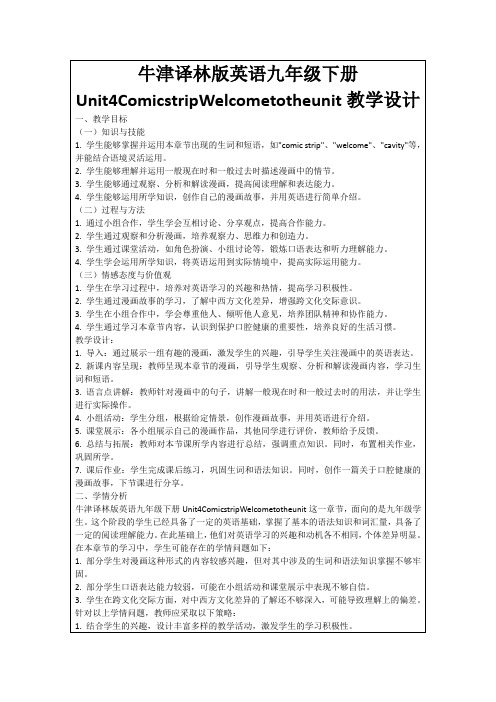
1.部分学生对漫画这种形式的内容较感兴趣,但对其中涉及的生词和语法知识掌握不够牢固。
2.部分学生口语表达能力较弱,可能在小组活动和课堂展示中表现不够自信。
3.学生在跨文化交际方面,对中西方文化差异的了解还不够深入,可能导致理解上的偏差。
针对以上学情问题,教师应采取以下策略:
牛津译林版英语九年级下册Unit4ComicstripWelcometotheunit教学设计
一、教学目标
(一)知识与技能
1.学生能够掌握并运用本章节出现的生词和短语,如"comic strip"、"welcome"、"cavity"等,并能结合语境灵活运用。
2.学生能够理解并运用一般现在时和一般过去时描述漫画中的情节。
2.练习题包括选择题、填空题、改错题等,涵盖生词、短语、语法等方面。
3.学生独立完成练习题,教师给予反馈和指导。
4.教师针对练习题中的共性问题,进行讲解和解答。
(五)总结归纳(500字)
1.教师对本节课所学内容进行总结,强调重点知识。
2.学生分享自己在课堂上的收获和感悟。
3.教师布置相关作业,巩固所学知识。
3.学生能够通过观察、分析和解读漫画,提高阅读理解和表达能力。
4.学生能够运用所学知识,创作自己的漫画故事,并用英语进行简单介绍。
(二)过程与方法
1.通过小组合作,学生学会互相讨论、分享观点,提高合作能力。
2.学生通过观察和分析漫画,培养观察力、思维力和创造力。
3.学生通过课堂活动,如角色扮演、小组讨论等,锻炼口语表达和听力理解能力。
4.情境模拟:设置真实的跨文化交际情境,让学生在实际交流中运用所学文化背景知识。
新版牛津版2020-2021学年九年级英语下册Unit4LifeonMarsGrammar教案

Unit4 Grammar一、教学目标1. 正确熟练地运用从句和简单句。
2. 掌握简单句和复合句之间的转换。
二、教学内容掌握词汇:aware, circle, agreement, distance, possibility, alien, stranger。
词组:as tasty as, remind of, how far, be away from, two earth years, circle around the Sun. work hard, come true, be different from, try to do, be similar to, sign of, be happy to do, indoor playground, the football field, the same as, hear from。
句型:(1)People might float in space because of the low gravity.(2)Humans cannot survive without food, water, or oxygen.(3)The smell of the pills reminds them of the tasty food on the Earth.(4)It takes Mars about two Earth years to circle around the Sun once.(5)I wonder how many people would like to move to Mars.(6)It is difficult to breathe on a planet that has much thinner air than that on the Earth.三、重点难点1. 正确熟练地运用从句和简单句。
2. 掌握简单句和复合句之间的转换。
牛津译林版英语九年级下册Unit4Task教学设计

三、教学重难点和教学设想
(一)教学重难点
1.知识与技能方面的重难点:
-学生的词汇、短语掌握程度,特别是与个人理想、目标相关的词汇和短语。
3.能够理解并运用目标语言描述自己的理想、目标和为实现目标所做的努力。
4.提高学生的阅读理解能力,通过阅读文章,能够获取、整理、归纳关键信息。
5.培养学生的写作能力,能够根据所学知识编写一篇关于个人理想的英语作文。
(二)过程与方法
1.通过小组合作、讨论、分享等方式,激发学生的学习兴趣,提高学生的英语表达能力。
(三)学生小组讨论
1.教学活动设计:
-将学生分成小组,每组讨论一个话题,如:“How can we achieve our dreams?”。
-每个小组整理讨论内容,准备进行课堂分享。
2.教学实施:
-教师巡回指导,关注每个小组的讨论进程,适时给予建议和鼓励。
-学生积极参与讨论,用英语表达自己的观点,提高口语表达能力。
3.情感态度与价值观方面的重难点:
-培养学生正确面对挑战和困难,树立坚定的信心和积极向上的心态。
-增强学生的团队合作意识,培养他们在合作中相互尊重、相互支持的品质。
(二)教学设想
1.创设情境,激发兴趣:
-利用多媒体展示不同职业的人物图片,让学生讨论自己的理想和目标,引入本节课的主题。
-通过讨论,引导学生运用所学词汇和短语描述自己的理想和为实现理想所做的努力。
5.增强学生的民族自豪感,让学生了解我国的发展成就,激发学生的爱国情怀。
新版牛津版2022-2021学年九年级英语下册Unit4LifeonMarsTask教案

Unit4 Task一、教学目标1. 完成一张流程图,并用流程图组织话题。
2. 写一份在另一个星球上生活的指南。
3. 复习本单元所学词汇和语法项目。
4. 通过练习增强学生的信心。
二、教学内容1. 单词:goods, electronic, entertainment2. 句型:(1)Here is a guide to living on Mars in the future.(2)Mars dollars are electronic and are stored in the Planet Mars Bank.(3)A very popular form of entertainment is online games.(4)But most people may prefer to watch the amazing low-gravity basketball games instead.3. 完成一份流程图,并用流程图组织话题。
4. 运用本单元所学词汇和句型,写一篇火星上的生活指南。
三、重点难点1. 完成一份流程图,并用流程图组织话题。
2. 运用本单元所学词汇和句型,写一篇火星上的生活指南。
四、教学过程Step 1 DiscussionAsk one student to organize a topic talk. He or she can divide the class into four groups. And each group has a specific topic about Mars. Eg: Group 1: The appearance of Mars.Group 2: Eating on Mars.Group 3: What to wear on Mars.Group 4: Studying on Mars.Students in each group should present their ideas about their topics in class.Step 2 ReadingAsk students to read through the phrases at the top of Part A. And make sure that they understand the meanings of these phrases. The teacher should give some explanations if necessary. Then have students read the phrases again by themselves.Step 3 Complete the spidergramDivide the class into small groups and let them talk about the spidergram. Ask students in each group to work together to complete the spidergram using the information above. After the students finish the work, ask some of them to present their spidergram on the slide show. Check the work with the whole class.Step 4 Writing1. Would you like to imagine your life on Mars? Write a passage to introducea student’s life on Mars. The questions below may help you organize the information for your writing.(1)What is your house like?(2)When do you begin and end your school day online?(3)What do you study in online schools?(4)How much is your homework?(5)What do you do in your free time?(6)How do you spend your pocket money?(7)How do you make friends on Mars?(8)How do you get along with your parents?2. Present their writing in class. Let one student from each group read his or her article to the class. Their articles can be put on the back wall after class.Step 5 Individual WorkOpen the books, and look at Part B. Explain the context of the draft. For students have discussed the flow chart, they should complete the draft by themselves. See if everyone can do it individually. Ask six students to read the six paragraphs, and check the answers with the whole class.Step 6 HomeworkWrite an article about their own life in the future.五、板书设计。
初中英语九年级下册(牛津译林版)Unit4lntegratedskills教学设计

3.能够运用阅读策略(如略读、寻读、精读)来获取、整理和归纳文章中的信息。
4.能够根据实际情况,设计并介绍自己的旅行计划,包括行程安排、预算、住宿和交通等方面。
5.能够在小组合作中,用英语进行有效沟通,展示自己的观点和倾听他人的意见。
2.在小组讨论过程中,教师巡回指导,观察学生的讨论情况,适时给予建议和反馈。
3.各小组展示并介绍自己的旅行计划,要求运用一般过去时描述旅行经历,其他小组给予评价和建议。
(四)课堂练习(500字)
1.设计一般过去时的写作练习,让学生撰写一篇关于自己旅行经历的文章,巩固所学语法知识。
2.进行阅读练习,选择一篇旅行相关的文章,让学生运用所学阅读策略,完成相应的任务,如填空、问答、归纳总结等。
(二)过程与方法
在本章节的教学过程中,学生将通过以下方法提高英语综合运用能力:
1.通过小组讨论、分享和角色扮演等活动,提高学生的听说能力和团队合作精神。
2.通过阅读旅行相关的文章,培养学生获取、整理和归纳信息的阅读策略。
3.通过写作练习,提高学生的书பைடு நூலகம்表达能力,巩固一般过去时的用法。
4.通过设计旅行计划,培养学生的创新思维和解决问题的能力。
-通过写作练习,让学生撰写自己的旅行经历,巩固一般过去时的用法。
2.针对旅行相关词汇和表达的教学,设想如下:
-制作旅行词汇卡片,让学生通过游戏、竞赛等形式学习和记忆词汇。
-结合实际旅行经历,让学生用英语介绍旅行中的住宿、交通、景点等,提高他们的语言表达能力。
3.针对阅读策略的培养,设想如下:
-选择旅行相关的文章,引导学生运用略读、寻读和精读等策略,获取、整理和归纳文章信息。
牛津译林版英语九年级下册Unit4Grammar教学设计

(一)导入新课(500字)
1.教学活动:教师以一段关于科技发展的短视频作为导入,引导学生关注视频中的被动语态和情态动词表达,激发学生对本节课的兴趣。
2.提问互动:教师提问学生关于视频中看到的科技产品和其特点,引导学生运用被动语态和情态动词进行回答,为新课的学习做好铺垫。
3.引入新课:教师通过学生回答的问题,顺势引入本节课的主题——Unit4 Grammar:Passive Voice and Modal Verbs,让学生明确学习目标。
-例如,使用PPT展示科技产品的介绍,引导学生运用被动语态描述产品的特点和应用。
-通过讨论环境问题,让学生使用情态动词表达对解决方案的看法和建议。
2.分层次教学:针对学生的不同水平,设计不同难度的练习和活动,确保每个学生都能在原有基础上得到提升。
-对于基础薄弱的学生,重点巩固被动语态的基本构成和情态动词的基本用法。
1.学生总结:学生回顾本节课所学内容,分享自己在课堂上的收获和感悟。
2.教师总结:教师对本节课的重点和难点进行梳理,强调被动语态和情态动词在实际语境中的应用。
3.归纳拓展:教师鼓励学生课后继续关注这两个语法点的用法,并在日常学习和生活中积极运用,提高英语水平。同时,为学生提供相关学习资源,便于课后复习和巩固。
在此阶段,大部分学生已经能够熟练运用一般现在时、一般过去时等基本时态,但对于被动语态、情态动词等高级语法的掌握仍不够扎实。因此,在教学过程中,教师需要关注学生的个体差异,因材施教,针对性地进行语法知识讲解和练习。
此外,九年级学生正处于青春期,他们的自尊心、自信心和同伴关系对他们学习英语的情感态度产生较大影响。教师在教学过程中应关注学生的情感需求,创设轻松愉快的课堂氛围,激发学生的学习兴趣,帮助他们建立自信,克服学习中的困难。
牛津版初中英语九年级下册Unit4 教案

Unit4 Comic strip and Welcome to the unit一、教学目标1. 思考未来的生活。
2. 思考在另一个行星上生活会是什么样子。
3. 讨论某一特定环境的优点和缺点。
二、教学内容1. 掌握词汇:Mars, helmet, air tank, dried food, power pack, sleeping bag。
词组:sleeping bag, air tank, on Mars。
句型:(1)What would it be like to live on Mars?(2)We’d probably need to wear special boots.(3)There’s no fruit or vegetables, so we would have to eat dried food.(4)But there would be no pollution on Mars.三、重点难点1. 讨论生活在火星上会是什么样子及其优点和缺点。
2. 用英语表达在火星上生活会是什么样子。
四、教学过程Step 1 Leading in1. Show a picture of Earth to students and have a short talk.T: Do you know the place in the picture?Ss: It’s Earth.T: Yes, our home. Why is it blue? Can you guess?Ss: It’s covered with water.2. Name the other planets in solar system. They can say them in Chinese if they don’t know the English names.Mercury, Venus, Mars, Jupiter, Saturn, Uranus, Neptune3. Show another picture about Yang Liwei and present some words.T: Do you know the man?Ss: He is Yang Liwei.T: Great. He is a hero and our country’s pride. Humans have been to the moon. And they have to wear helmets and take cameras with them to take photos. Do you want to have a space travel to Mars?Ss: Yes, we do.Step 2 Listening and Practising1. Tell students Eddie and Hobo are now living on Mars. And listen to their conversation and find out how Eddie likes life on Mars.2. Listen again for students to follow it.3. Read the dialogue in pairs and then act it out.4. Learn the sentence patterns.How do you like...? = What do you think of...?Step 3 Presentation1. Show them several pictures and find out the problems with Earth, such as polluted, crowded.2. Tell them the scientists think Mars is the most probable planet in solar system for humans to live on.We can imagine what life will be like on Mars.3. Two or four students in a group discuss if life on Mars is better than that on Earth at present. Encourage them to think over the reasons.4. Read each sentence in Part A and do a survey about advantages of living on Earth.Step 4 Discussion1. Read the words twice in Part B.2. T: People have been to the moon already. Daniel is dreaming about camping on the moon. Do you also want to go there? Look at the items in the picture in Part B and choose what you will take with, talk about your reasons. Discuss them with your partners.3. Choose several groups to state their choices and reasons, then recommend two best groups and give them each a red star as a reward.Step 5 Word gameT: Guess the word according to its meaning.1. When you travel to space, you should wear it on your head. What is it? (helmet)2. You often wear them on a hot sunny day to protect your eyes. (sunglasses)3. A kind of machine like a person. (robot)4. It’s a simple house that people can live in when they go camping, (tent)Step 6 PracticeDo the exercises on Students’ Book.Step 7 HomeworkRemember the important words and expressions.五、板书设计Unit4 Grammar一、教学目标1. 正确熟练地运用从句和简单句。
九年级英语下册Unit4LifeonMarsTask教案(新版)牛津版
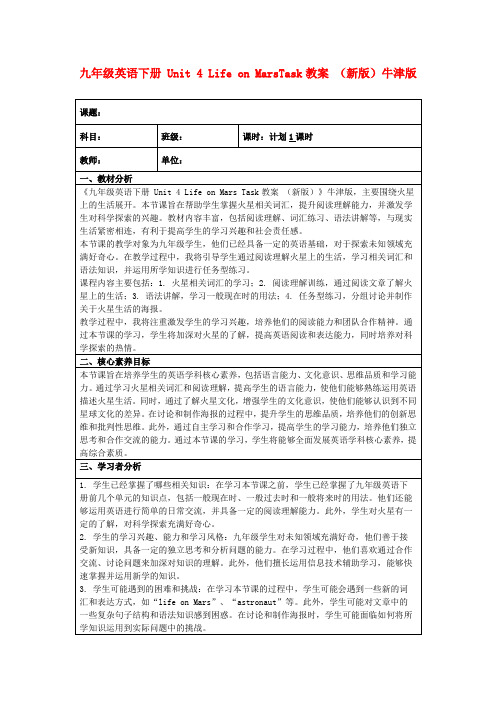
在今天教授九年级英语下册Unit 4 Life on Mars Task的过程中,我深感教学是一项需要不断反思和总结的工作。首先,我注意到在导入新课时,通过提问和展示火星图片的方式,学生们的兴趣被有效激发,这让我意识到利用多媒体资源能够极大地提高学生的学习积极性。
然而,在讲解火星基础知识时,我发现在处理一些复杂句子结构和语法知识时,学生的理解出现了困难。这让我反思在今后的教学中,我需要更加注重语法点的解释和练习,确保学生们能够充分理解和掌握。
教学过程中,我将注重激发学生的学习兴趣,培养他们的阅读能力和团队合作精神。通过本节课的学习,学生将加深对火星的了解,提高英语阅读和表达能力,同时培养对科学探索的热情。
二、核心素养目标
本节课旨在培养学生的英语学科核心素养,包括语言能力、文化意识、思维品质和学习能力。通过学习火星相关词汇和阅读理解,提高学生的语言能力,使他们能够熟练运用英语描述火星生活。同时,通过了解火星文化,增强学生的文化意识,使他们能够认识到不同星球文化的差异。在讨论和制作海报的过程中,提升学生的思维品质,培养他们的创新思维和批判性思维。此外,通过自主学习和合作学习,提高学生的学习能力,培养他们独立思考和合作交流的能力。通过本节课的学习,学生将能够全面发展英语学科核心素养,提高综合素质。
- Evidence:water, ice
- Future missions:colonization, habitats
- Possibilities:human presence on Mars
这样的板书设计条理清楚、重点突出,便于学生理解和记忆。
在进行火星案例分析时,我发现学生们在讨论中提出了许多有创见的想法,这让我感到欣慰,因为这说明他们的思维能力和创造力得到了锻炼。但同时,我也注意到部分学生在小组讨论中显得较为被动,这提示我需要更多地鼓励和引导他们参与到课堂活动中来。
牛津版初中英语九年级下册Unit4 教案
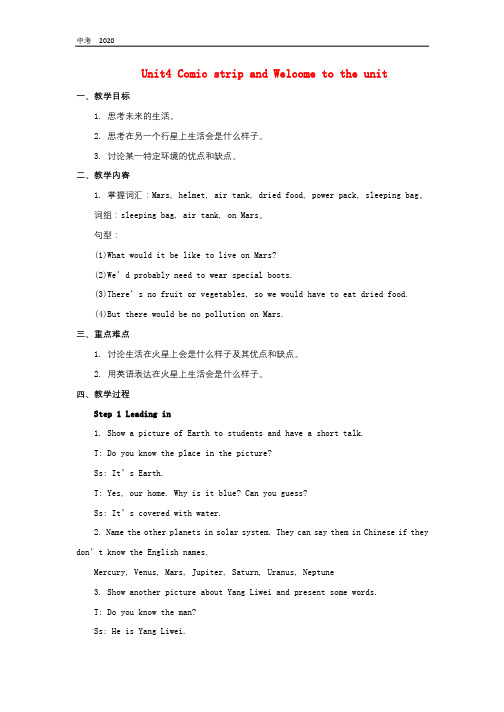
Unit4 Comic strip and Welcome to the unit一、教学目标1. 思考未来的生活。
2. 思考在另一个行星上生活会是什么样子。
3. 讨论某一特定环境的优点和缺点。
二、教学内容1. 掌握词汇:Mars, helmet, air tank, dried food, power pack, sleeping bag。
词组:sleeping bag, air tank, on Mars。
句型:(1)What would it be like to live on Mars?(2)We’d probably need to wear special boots.(3)There’s no fruit or vegetables, so we would have to eat dried food.(4)But there would be no pollution on Mars.三、重点难点1. 讨论生活在火星上会是什么样子及其优点和缺点。
2. 用英语表达在火星上生活会是什么样子。
四、教学过程Step 1 Leading in1. Show a picture of Earth to students and have a short talk.T: Do you know the place in the picture?Ss: It’s Earth.T: Yes, our home. Why is it blue? Can you guess?Ss: It’s covered with water.2. Name the other planets in solar system. They can say them in Chinese if they don’t know the English names.Mercury, Venus, Mars, Jupiter, Saturn, Uranus, Neptune3. Show another picture about Yang Liwei and present some words.T: Do you know the man?Ss: He is Yang Liwei.T: Great. He is a hero and our country’s pride. Humans have been to the moon. And they have to wear helmets and take cameras with them to take photos. Do you want to have a space travel to Mars?Ss: Yes, we do.Step 2 Listening and Practising1. Tell students Eddie and Hobo are now living on Mars. And listen to their conversation and find out how Eddie likes life on Mars.2. Listen again for students to follow it.3. Read the dialogue in pairs and then act it out.4. Learn the sentence patterns.How do you like...? = What do you think of...?Step 3 Presentation1. Show them several pictures and find out the problems with Earth, such as polluted, crowded.2. Tell them the scientists think Mars is the most probable planet in solar system for humans to live on.We can imagine what life will be like on Mars.3. Two or four students in a group discuss if life on Mars is better than that on Earth at present. Encourage them to think over the reasons.4. Read each sentence in Part A and do a survey about advantages of living on Earth.Step 4 Discussion1. Read the words twice in Part B.2. T: People have been to the moon already. Daniel is dreaming about camping on the moon. Do you also want to go there? Look at the items in the picture in Part B and choose what you will take with, talk about your reasons. Discuss them with your partners.3. Choose several groups to state their choices and reasons, then recommend two best groups and give them each a red star as a reward.Step 5 Word gameT: Guess the word according to its meaning.1. When you travel to space, you should wear it on your head. What is it? (helmet)2. You often wear them on a hot sunny day to protect your eyes. (sunglasses)3. A kind of machine like a person. (robot)4. It’s a simple house that people can live in when they go camping, (tent)Step 6 PracticeDo the exercises on Students’ Book.Step 7 HomeworkRemember the important words and expressions.五、板书设计Unti4 Comic strip and Welcome to the unit1. Phrases:special boots, sleeping bags, space helmet, think about2. Sentences:How do you like life on Mars?= What do you think of life on Mars?Unit4 Grammar一、教学目标1. 正确熟练地运用从句和简单句。
九年级英语下册 Unit 4 Life on Mars Study skills教案 (新版)牛津版

Unit 4 Life on MarsStudy skillsI. Teaching aims and learning objectivesBy the end of the lesson, students should be able to:1.know the usage of self- assessment;2.finish their own self-assessment;3.make a study plan according to the self-assessment.II. Focus of the lesson and predicted area of difficultyMakestudents’ own study plans.III.Teaching proceduresStep 1Lead-in1.Free talkT: Are you satisfied with your English study?If your answer is “yes”, can you tell me why?If your answer is “no”, what are you weak in learning English, listening, speaking, reading or writing?2.What is self-assessment?T: To do self-assessment means to think about your studies in order to find out your strengths and weakness. This can help you make a plan to improve the way you study.Step 2 Presentation1. Read Kitty’s self-assessmentT: Read Kitty’s self-assessment and answer the following questions.(1) Does Kitty often speak English in class?(2) What mistakes does she often make in her English study?(3) Is Kitty good at English listening?(4) What problems does she have in her English study?2.Read Kitty’s study planT: Kitty has made a study plan according to her self-assessment. What do you think of her ideas? Do you have any better ideas for her?Step 3 Production1.plete your own self-assessment form2. Write your own plan for studying EnglishT: Then write your own plan for studying English. If you have any difficulties, you can ask your partner or me for help.IV.HomeworkFinish the study plan.。
牛津九年级Unit4教学设计及教案
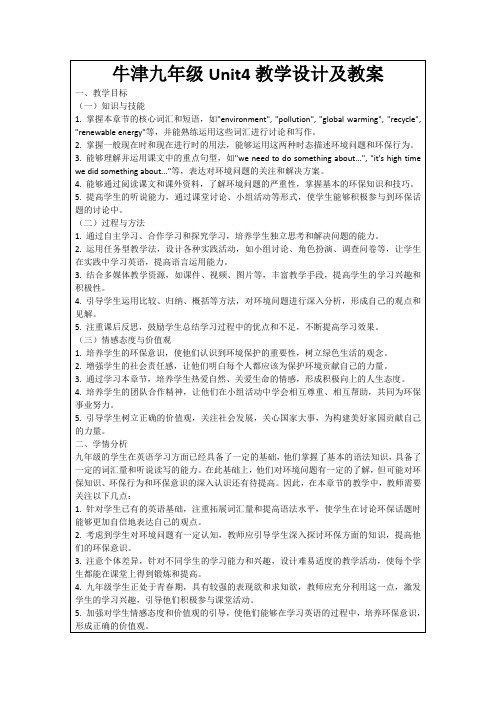
5.拓展作业:
a.观看一部关于环保的英文电影或纪录片,了解全球环境问题的现状和解决方案。
b.阅读英文版的环保科普书籍,拓展知识面,提高环保意识。
作业布置要求:
1.学生需按时完成作业,注意作业质量,做到书写工整、表达清晰。
2.教师在批改作业时,要关注学生的语言运用能力,给予针对性的指导和评价。
b.学生跟随教师朗读例句,模仿并运用两种时态进行练习。
c.教师呈现与环境问题相关的词汇和表达,引导学生学习和掌握。
d.学生进行词汇练习,如填空、翻译等,巩固所学内容。
(三)学生小组讨论
1.教学活动:学生分组讨论,针对环境问题提出解决方案。
2.教学目的:培养学生的合作精神,提高学生运用英语进行讨论的能力。
5.提高学生的听说能力,通过课堂讨论、小组活动等形式,使学生能够积极参与到环保话题的讨论中。
(二)过程与方法
1.通过自主学习、合作学习和探究学习,培养学生独立思考和解决问题的能力。
2.运用任务型教学法,设计各种实践活动,如小组讨论、角色扮演、调查问卷等,让学生在实践中学习英语,提高语言运用能力。
3.结合多媒体教学资源,如课件、视频、图片等,丰富教学手段,提高学生的学习兴趣和积极性。
3.通过学习本章节,培养学生热爱自然、关爱生命的情感,形成积极向上的人生态度。
4.培养学生的团队合作精神,让他们在小组活动中学会相互尊重、相互帮助,共同为环保事业努力。
5.引导学生树立正确的价值观,关注社会发展,关心国家大事,为构建美好家园贡献自己的力量。
二、学情分析
九年级的学生在英语学习方面已经具备了一定的基础,他们掌握了基本的语法知识,具备了一定的词汇量和听说读写的能力。在此基础上,他们对环境问题有一定的了解,但可能对环保知识、环保行为和环保意识的深入认识还有待提高。因此,在本章节的教学中,教师需要关注以下几点:
沪教牛津版初中英语九年级下册教案教学设计u4-2
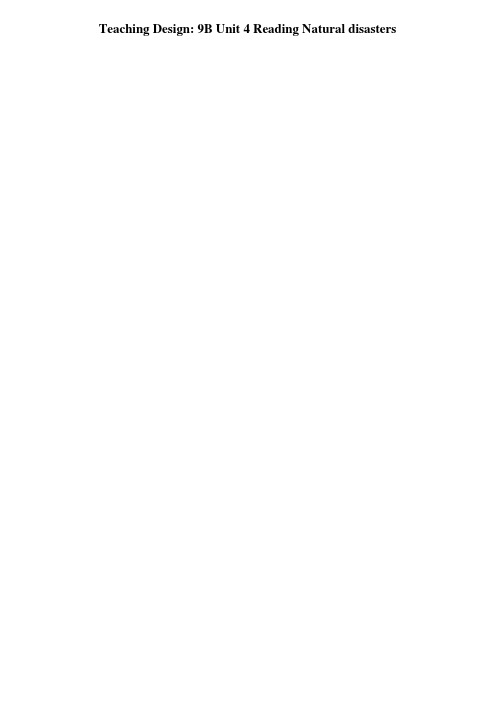
1. Play a video clip about a natural disaster and let Ss tell what happened. Ask Ss what the natural disaster is. 2.Show some pictures of natural disasters.
To help Ss get a clear viewof
what is a natural disaster and name different natural disasters.
3
Step 2
Pre-task stage
1.Predict the content of the text according to the pictures, the title and the first paragraph.
key points
Learn about the general idea and details of the text
Difficult points
Retell the text and understand the moral of the story.
Teaching procedures
2.Ability aims: Students can skim and predict the content of the text. Students can learn about the general idea and main content of the text.
3.Emotional aims: Students can recognize the moral of a story and raise the awareness of protecting nature and environment.
九年级英语下册 Unit 4 Life on Mars Integrated skills教案 (新版)牛津版
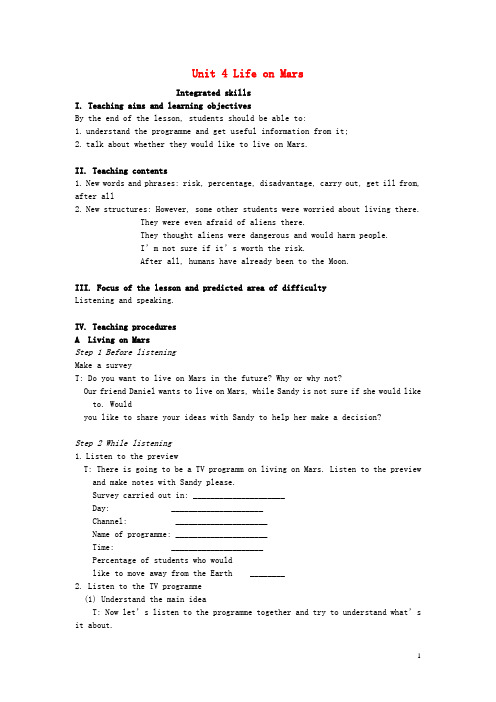
Unit 4 Life on MarsIntegrated skillsI. Teaching aims and learning objectivesBy the end of the lesson, students should be able to:1.understand the programme and get useful information from it;2.talk about whether they would like to live on Mars.II. Teaching contents1.New words and phrases: risk, percentage, disadvantage, carry out, get ill from,after all2.New structures: However, some other students were worried about living there. They were even afraid of aliens there.They thought aliens were dangerous and would harm people.I’m not sure if it’s worth the risk.After all, humans have already been to the Moon.III. Focus of the lesson and predicted area of difficultyListening and speaking.IV. Teaching proceduresA Living on MarsStep 1 Before listeningMake a surveyT: Do you want to live on Mars in the future? Why or why not?Our friend Daniel wants to live on Mars, while Sandy is not sure if she would like to. Wouldyou like to share your ideas with Sandy to help her make a decision?Step 2 While listening1.Listen to the previewT: There is going to be a TV programm on living on Mars. Listen to the previewand make notes with Sandy please.Survey carried out in: _____________________Day: _____________________Channel: _____________________Name of programme: _____________________Time: _____________________Percentage of students who wouldlike to move away from the Earth ________2. Listen to the TV programme(1) Understand the main ideaT: Now let’s listen to the programme together and try to understand what’sit about.(2) Fill in the blanksT: Listen to the pragramme again and write down the advantages and the disadvantages of living on Mars.T: Complete the conversation with the information you’ve got.(3) Listen and discussT: Listen to the programme for the third time. Think over how Daniel and Sandy feel about the programme.B Speak up: Earth or Mars?Step 1 After listeningShare your ideasT: After watching the TV programme, how do you feel about living on Mars? Would you like to go there?S: I’d love to live on Mars, because ....I’m not sure if it’s worth the risk ....Step 2 Practice1.Listen and answerT: Listen to the dialogue between Daniel and Sandy, and answer the following questions.(1) Who would like to live on Mars, Simon or Daniel?(2) Would Sandy like to live on Mars? Why or why not?2.Make a similar dialogueV. Homework1. Recite Part B.2. Talk more about living on Mars after class.。
九年级英语下册Unit4LifeonMarsGrammar教案(新版)牛津版
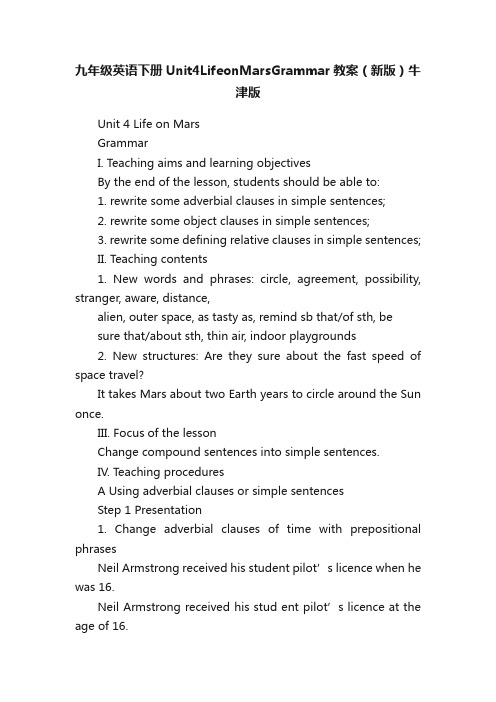
九年级英语下册Unit4LifeonMarsGrammar教案(新版)牛津版Unit 4 Life on MarsGrammarI. Teaching aims and learning objectivesBy the end of the lesson, students should be able to:1. rewrite some adverbial clauses in simple sentences;2. rewrite some object clauses in simple sentences;3. rewrite some defining relative clauses in simple sentences;II. Teaching contents1. New words and phrases: circle, agreement, possibility, stranger, aware, distance,alien, outer space, as tasty as, remind sb that/of sth, besure that/about sth, thin air, indoor playgrounds2. New structures: Are they sure about the fast speed of space travel?It takes Mars about two Earth years to circle around the Sun once.III. Focus of the lessonChange compound sentences into simple sentences.IV. Teaching proceduresA Using adverbial clauses or simple sentencesStep 1 Presentation1. Change adverbial clauses of time with prepositional phrasesNeil Armstrong received his student pilot’s licence when he was 16.Neil Armstrong received his stud ent pilot’s licence at the age of 16.2. Change adverbial clauses of reason with prepositional phrasesPeople might float in space because the gravity is low.People might float in space because of the low gravity.3. Change adverbial clauses of condition with prepositional phrases.Humans cannot survive if there is no food, air or oxygen.Humans cannot survive without food, air or oxygen.【设计意图:利用图片提出问题,引出从句,启发学生改写成简单句。
九年级英语下册 Unit 4 Life on Mars Study skills教
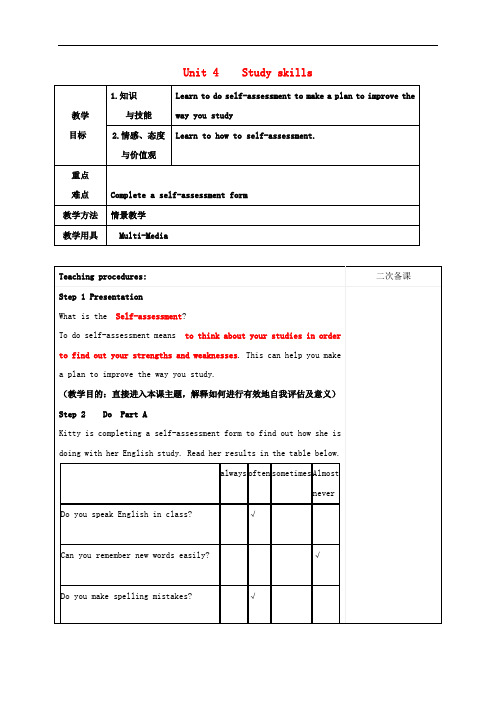
I plan to watch English TV programmes every weekend in order to improve my listening skills.
Unit 4 Study skills
教学Байду номын сангаас
目标
1.知识
与技能
Learn to do self-assessment to make a plan to improve the way you study
2.情感、态度与价值观
Learn to how to self-assessment.
重点
难点
Complete a self-assessment form
(教学目的:直接进入本课主题,解释如何进行有效地自我评估及意义)
Step 2 DoPart A
Kitty is completing a self-assessment form to find out how she is doing with her English study. Read her results in the table below.
After doing the self-assessment, kitty is making a plan for studying English. Read her plan. Do you think she has some good ideas?
- 1、下载文档前请自行甄别文档内容的完整性,平台不提供额外的编辑、内容补充、找答案等附加服务。
- 2、"仅部分预览"的文档,不可在线预览部分如存在完整性等问题,可反馈申请退款(可完整预览的文档不适用该条件!)。
- 3、如文档侵犯您的权益,请联系客服反馈,我们会尽快为您处理(人工客服工作时间:9:00-18:30)。
Unit4 Comic strip and Welcome to the unit一、教学目标1. 思考未来的生活。
2. 思考在另一个行星上生活会是什么样子。
3. 讨论某一特定环境的优点和缺点。
二、教学内容1. 掌握词汇:Mars, helmet, air tank, dried food, power pack, sleeping bag。
词组:sleeping bag, air tank, on Mars。
句型:(1)What would it be like to live on Mars?(2)We’d probably need to wear special boots.(3)There’s no fruit or vegetables, so we would have to eat dried food.(4)But there would be no pollution on Mars.三、重点难点1. 讨论生活在火星上会是什么样子及其优点和缺点。
2. 用英语表达在火星上生活会是什么样子。
四、教学过程Step 1 Leading in1. Show a picture of Earth to students and have a short talk.T: Do you know the place in the picture?Ss: It’s Earth.T: Yes, our home. Why is it blue? Can you guess?Ss: It’s covered with water.2. Name the other planets in solar system. They can say them in Chinese if they don’t know the English names.Mercury, Venus, Mars, Jupiter, Saturn, Uranus, Neptune3. Show another picture about Yang Liwei and present some words.T: Do you know the man?Ss: He is Yang Liwei.T: Great. He is a hero and our country’s pride. Humans have been to the moon. And they have to wear helmets and take cameras with them to take photos. Do you want to have a space travel to Mars?Ss: Yes, we do.Step 2 Listening and Practising1. Tell students Eddie and Hobo are now living on Mars. And listen to their conversation and find out how Eddie likes life on Mars.2. Listen again for students to follow it.3. Read the dialogue in pairs and then act it out.4. Learn the sentence patterns.How do you like...? = What do you think of...?Step 3 Presentation1. Show them several pictures and find out the problems with Earth, such as polluted, crowded.2. Tell them the scientists think Mars is the most probable planet in solar system for humans to live on.We can imagine what life will be like on Mars.3. Two or four students in a group discuss if life on Mars is better than that on Earth at present. Encourage them to think over the reasons.4. Read each sentence in Part A and do a survey about advantages of living on Earth.Step 4 Discussion1. Read the words twice in Part B.2. T: People have been to the moon already. Daniel is dreaming about camping on the moon. Do you also want to go there? Look at the items in the picture in Part B and choose what you will take with, talk about your reasons. Discuss them with your partners.3. Choose several groups to state their choices and reasons, then recommend two best groups and give them each a red star as a reward.Step 5 Word gameT: Guess the word according to its meaning.1. When you travel to space, you should wear it on your head. What is it? (helmet)2. You often wear them on a hot sunny day to protect your eyes. (sunglasses)3. A kind of machine like a person. (robot)4. It’s a simple house that people can live in when they go camping, (tent)Step 6 PracticeDo the exercises on Students’ Book.Step 7 HomeworkRemember the important words and expressions.五、板书设计Unit4 Grammar一、教学目标1. 正确熟练地运用从句和简单句。
2. 掌握简单句和复合句之间的转换。
二、教学内容掌握词汇:aware, circle, agreement, distance, possibility, alien, stranger。
词组:as tasty as, remind of, how far, be away from, two earth years, circle around the Sun. work hard, come true, be different from, try to do, be similar to, sign of, be happy to do, indoor playground, the football field, the same as, hear from。
句型:(1)People might float in space because of the low gravity.(2)Humans cannot survive without food, water, or oxygen.(3)The smell of the pills reminds them of the tasty food on the Earth.(4)It takes Mars about two Earth years to circle around the Sun once.(5)I wonder how many people would like to move to Mars.(6)It is difficult to breathe on a planet that has much thinner air than that on the Earth.三、重点难点1. 正确熟练地运用从句和简单句。
2. 掌握简单句和复合句之间的转换。
四、教学过程Step 1 RevisionMake sentences with at the age of, because of, without.eg: I could ride a bike at the age of five.He didn’t go to school because of his serious illness.Fishes can not live without water.Step 2 Learning Part A1. Tell students that we can rewrite adverbial clauses in simple sentences with preposition phrases beginning with at the age of, because of and without.I could rick a bike when I was five years old. =I could ride a bike at the age of five.He didn’t go to school because he had a badly ill. = He didn’t go to school because of his serious illness.Fishes can not live if there is no water = Fishes can not live without water.2. Ask students to do the exercise on P56 in pairs or on their own. Check the answers with the whole class.(1)Neil Armstrong took his first flight at the age of six.(2)Yuri Gagarin became the first man to go into outer space when he was seventeen years old.(3)People might move to another planet in the future because of the badpopulation.(4)Meals will not be as tasty as they are today without the fresh food.(5)It would be funny to play football on Mars because there are low gravity.(6)If there isn’t special boots, we cannot walk on Mars.Step 3 Learning Part BTell the students that we can rewrite some object clauses in simple sentences with prepositions like of and about.Ask students to do the exercise on P57 in pairs or on their own. Check the answers with the whole class.1. Are you aware of the distance from Mars to the Sun? (be aware of)2. Do scientists agree with the possibility of living on Mars?3. Do they thought about the low gravity problems on Mars?4. Are you aware of the transports on Mars?5. I wonder about the number of the people who would like to move to Mars.6. I think people should know about the differences between Mars life and the Earth life.Step 4 Learning Part CRemind the students that rewrite some defining relative clauses in simple sentences with prepositions like with and in. Let the students do the exercise on P58 in pairs and check their answers.1. Mars is a planet with an environment similar to the Earth.2. Astronauts in space suits and helmets might stay on Mars for hours.3. It is difficult to breathe on a planet with much thinner air.4. On Mars there might be people with air tanks on their backs.C21. Humans are... because of the serious pollution on the Earth.2. Many people do not doubt of the interesting life on Mars.3. We could not play football on Mars with the low gravity.4. Life would be boring for me without football.5. Maybe this problem… with the same football fields as those on the Earth.Step 5 ConclusionThe students go through the knowledge according to the big screen.Step 6 Homework1. Review the grammar.2. Preview Integrated skills and Study skills.五、板书设计Unit4 Integrated skill and Study skills一、教学目标1. 听一段电视节目广告,从中获取信息,完成笔记。
